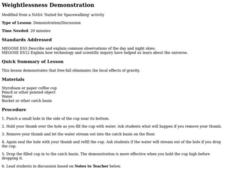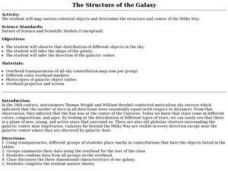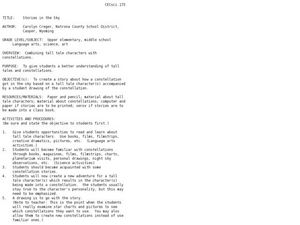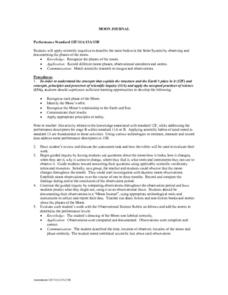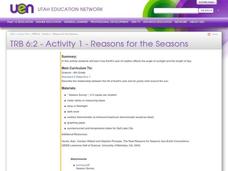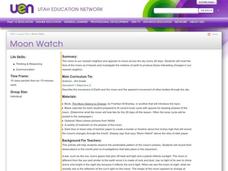Curated OER
"Twinkle, Twinkle, Little Star"
Second graders sing the son "Twinkle, Twinkle, Little Star." They are asked:"How many of you have looked at the stars in the sky on a clear night? Have you ever wished on a star? What did you wish?" Students are explained the concept...
Curated OER
How Bright are the Stars?
Students observe the brightness of stars and are introduced to the concept of apparent brightness as a measure of how much light hits a detector of a surface area during a given time. In this star instructional activity, students make...
Curated OER
Modeling the Big Bang and the Formation of the Universe
Sixth graders conduct an experiment to understand the Big Bang Theory. In this Big Bang Theory lesson, 6th graders will observe a balloon with confetti popping to emulate and analyze information related tot he Big Bang theory. Students...
Curated OER
Bouncing Sunlight
Third graders use flashlights and balls to demonstrate how the light bounces off of the sun and reflects onto the moon. They record their observations in a journal.
Curated OER
Astronomy Merit Badge
Young scholars explore astronomy through the Starry Night Constellation Adventure software. They print star charts and identify constellations. They sketch the Big Dipper and describe the Milky Way. They list the five most visible...
Curated OER
Lunar Cycle
Students recognize that the eight phases of the moon repeat. In this lunar cycle instructional activity, students experiment to understand the phases of the moon. Students make observations and complete a "the Moon I See" worksheet. ...
Curated OER
What Shape is the Moon Tonight?
Learners understand that the moon appears differently throughout the month. In this phases of the moon lesson, students observe and record the phases of the moon.
Curated OER
Weightlessness Demonstration
Students investigate gravity. In this weightless lesson students complete a lab activity about how a free fall might effect how one perceives gravity.
Curated OER
The Structure of the Galaxy
Students infer the galaxy shape. In this structure of the galaxy lesson plan students observe the distribution of objects in the sky and answer questions.
Curated OER
Looking Back, Up and Ahead
Students explore how scientists have forecasted the 2002 Leonid meteor shower. They pose their own predictions for peak meteor rates per hour during the 2002 shower and compare their results with actual observed rates.
Curated OER
Seeing Interference Fringes with a Telescope
Students construct an interferometer using a simple telescope. In this physics instructional activity, students explain how light waves create the fringe patterns. They observe patterns made by different objects in the sky and compare them.
Curated OER
Constellations
Middle schoolers explore the major constellations. After reviewing the Earth's basic motions and their significance, students discuss the moon's orbit and revolutions. Using a Digitarium Alpha portable planetarium projector, they...
Curated OER
Mother Earth - Father Sky
Third graders research and write about Cyrus Dillan. They explain one of Dillan's sculptures. Students locate six constellations and two planets. They research and write about the daily life of the Pawnee.
Curated OER
Stories in the Sky
Students discover the concept of combining constellations and tall tales. In this tall tale lesson, students compare constellations to tale tales. They create their own tall tale and constellation.
Curated OER
What is Weather?
In this weather learning exercise, students photograph and record the weather conditions for a week. Then they list the types of clouds observed and the weather conditions they noted associated with each cloud type. Students also write a...
Curated OER
Moon Journal
Fourth graders observe Moon and its features, and record results both in written form and in a drawing on the given template.
Curated OER
Hello, Sunshine!
Middle schoolers investigate how the sun travels across the sky at different latitudes using Solar Motion Demonstrator. In this earth science instructional activity, students explain why seasons change. They study how the tilt of the...
Curated OER
Exploring the Interstellar Medium
Students investigate the Interstellar Medium and the Local Bubble that the Sun is inside. They read and discuss a handout, answer discussion questions, observe a demonstration of light scattering, and conduct an experiment on the...
Curated OER
Reasons for the Seasons
Sixth graders conduct and analyze a survey that explores public perceptions about the reasons for seasonal change. They measure the changing length of days, observe shadows and discuss how the Earth's axis of rotation affects the seasons.
Curated OER
Star Patterns
Third graders create constellation maps and record their own legends of how constellations came into existence. After observing the sky at night, 3rd graders discuss star maps, read previously recorded legends on the origin of stars. ...
Curated OER
Moon Watch
Third graders read books about the moon and discuss its perceived changes as it moves across the sky. They observe the moon over the course of a month and chart their observations. They discuss their observations and conduct further...
Curated OER
Six Insect Legs
Students observe and discuss the sun's position in the sky. They explore the number six, read various number books, and create the number six page for a counting book.
Curated OER
Scavenger Hunt
Young scholars study a research telescope to obtain quantitative information about these objects. They use the SkyServer Navigation Tool to identify objects and record celestial coordinates. In addition, they associate star brightness...
Curated OER
A DISAPPEARING ACT Astronomy: Do Stars Always Shine?
Students observe why stars are not visible during the day with a classroom demonstration using an index card punched with holes.









